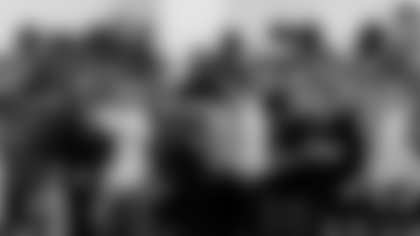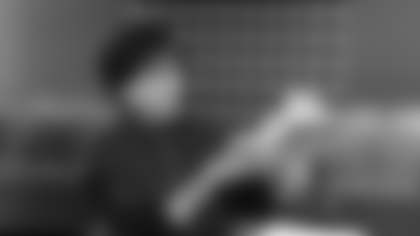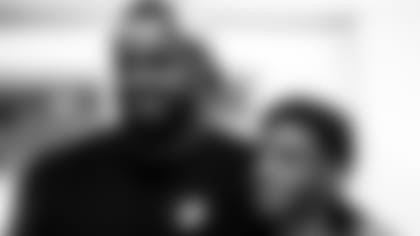It was announced today that safety Sammy Knight was elected to the New Orleans Saints Hall of Fame. Facing long odds, after coming into the NFL as an undrafted free agent, after playing linebacker at the University of Southern California, he transitioned to safety as a rookie in 1997 and made an immediate impact for the Saints by leading all NFL rookies with five interceptions.
Overall in six seasons in New Orleans, Knight finished with 624 tackles (441 solo), five sacks, 28 interceptions, four returned for touchdowns63 pass defenses, five forced fumbles and ten fumble recoveries. Showing a nose for the ball, he is ranked third in club record books in picks and is still the all-time team leader for interception returns for scores.
Consistent, hard-hitting play was a hallmark for Knight, who recorded at least five interceptions in five of his six seasons with the black and gold, the sole exception being when he played strong safety in 1999. Among his finest seasons was the 1998 campaign, when his six picks were returned for 171 yards, including two TDs; 2000, when he had six picks again, one for a score and also recorded two more interceptions in New Orleans' first career playoff win, and in 2001, when he was selected as a Pro Bowl starter after leading the Saints in interceptions (six) and fumble recoveries (five) as he finished second in the NFL with 11 total takeaways.
After leaving New Orleans, Knight played for six more years with Miami, Kansas City, Jacksonville and the New York Giants and wrapped up his career with 42 picks total. Now he has moved on to starting his coaching career as a graduate assistant at his alma mater.
Accompanied by his wife Freda at the press conference/luncheon for his election, looking like he could suit up tomorrow still, Knight sat down for a Q&A with NewOrleansSaints.com.
Congratulations. Can you talk about your feeling about joining the Saints Hall of Fame, joining former teammates such as Joe Horn, Wayne Martin, Willie Roaf and Joe Johnson?
"I'm really proud to have been chosen to join the Saints Hall of Fame. This is a really exciting time in mine, my wife's and family's life and we're happy to be able to share it with the fans.
How proud are you of your 12-year playing career, given how you had to start out as an undrafted free agent in 1997 and that you had a longer and more productive career than most players picked that year in the first round, never mind overall?
I felt very good about my career. I was very fortunate first of all for God keeping me healthy throughout most of my career. That was the first thing as a lot of people had serious injuries. After that, I was fortunate to be put in the right situations where I was able to showcase my skills.
Can you go back to your rookie year, your initial expectations as an undrafted free agent and what you credit towards inching into the starting lineup and enjoying a long, productive career?
My mindset (after not being drafted) was that everybody's going to pay. I told myself I had to go out and play and show everyone what I could do. Right after I was drafted everybody called up and said you'd have a shot to make their team. I just looked at all the teams and (I felt) New Orleans was a team where I felt like I could go play. They didn't have a lot of great safeties here, so I felt like I could go showcase my skills. I talked to coach (Mike) Ditka and he said he'd give me a fair shot to make this team.
What set your time in New Orleans apart from other stops?
The number one thing was the fans. This city is very warm, very cultured, a loving city. It embraces you no matter where you are or how much money you make. They embrace you as a person. Our team took on that same mindset of the city and the organization did too. After practice, you would have conversations with people, whether it's laughing with Chief (Dan Simmons) or Silky (Glennon Powell). You don't do that everywhere. This is a special place.
What was your most special moment as a Saint?
There were a lot of them. The playoff game was really a big moment. My first start, because it was so unexpected. I was a strong safety for the first four games and right before the game on game day, they told me I'd be starting at free safety. It was a shocker. Back then the safety positions weren't as interchangeable as today. I felt like I had to go play. It doesn't matter if it's free safety or strong safety. It's football.
You had two interceptions in a key game against the Falcons in 2000, which clinched the club's first playoff berth since 1992. Was that a big one?
I remember that. Going into that season, we had won three games and people did not think we were headed to the playoffs. Winning the division like we did was big. We turned it around. There was a change in mindset around the New Orleans Saints as well as with the fans.
What about the game you had two weeks later in the Wild Card Playoffs with two picks against the Rams to help the franchise to their first postseason victory. One pick set up a go-ahead field goal at the end of the first half. Your fourth quarter interception occurred on a first and nine play at the Saints nine-yard line. Even though your interceptions led to only three points, wasn't it more crucial stealing a couple of possessions from Kurt Warner, Marshall Faulk and that high-powered offense?
The biggest thing was that we were doing it against the Rams. This was a team that was coming off a Super Bowl win. For us to do that against the high-powered offense they were was special.
Even though you later played for other teams, what do you think of the most recent developments with the team and their recent success?
My hat is off to Sean Payton and what he's done here. I remember coming here in 2007 as a member of Jacksonville and Drew Brees was outstanding. Between Coach Payton, Drew Brees and the defense, they have done a great job.
Are there some former teammates that you talk to a lot from the old squads?
I talk to guys all the time. There are guys I talk to from those teams more so than others. I talk to Kevin Mathis, Fred Thomas, Jay Bellamy, Alex Molden, Keith Mitchell, La'Roi Glover. We're constantly in contact. We talk five, six, seven times a year if not once a month. Those are guys that are good friends.
Was there a particular pick, or big play that you remember for more significance?
There are a couple. I remember a pick I had in Arizona for a touchdown return against Jake Plummer. I remember the last time I had played in that Stadium (with USC), they (Arizona State) had beaten us in double overtime. I remember one in 1998 against the Vikings, because Cris Carter, he and I were both slow and I was chasing him. He said he never thought he had seen a guy slower. I also remember the playoff pick against Kurt Warner."
After finishing your career, what did you do for a couple years?
I did some broadcasting with both the NFL and college before going back to USC as a coach.
What led you in to the coaching field?
Everybody told me I'd be a pretty good coach. I wanted to stay in touch with the game somehow. When I was broadcasting, I'd see a lot of football but it was frustrating, because there were a lot of things going on that you thought you could change. All you could do was comment on it though. I realize the work coaches have to go through, the work we put in as well as the thought pattern.
What has it been like so far and not looking far ahead, do you think that this will be your career moving forward?
It's been great. It's not easy. It's tough work. You're away from your family. That's the tough part. The rewarding part is seeing these kids play. Through them you see yourself 15 or 20 years ago. You're just trying to put them in some of the situations that you've been through, help them learn, while also helping them learn from some of the things you've done.












